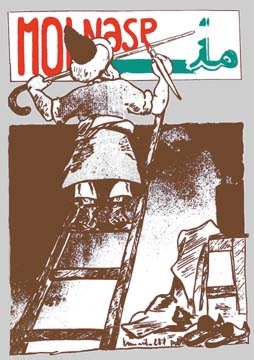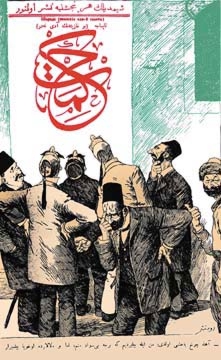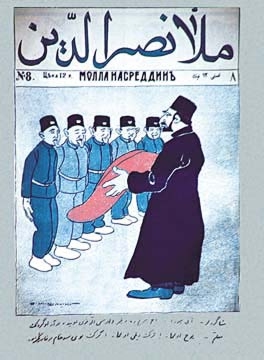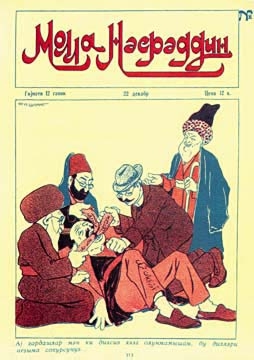|

Spring
2000 (8.1)
Language and
Alphabet Transitions
In Molla
Nasraddin Magazine
Editor
Jalil Mammadguluzade (published from 1906-1932)

  "Molla Nasraddin"
(1906-1932) was one of the most important magazines ever to be
published in the Caucasus. In this eight-page, biweekly publication,
editor Jalil Mammadguluzade and his staff of cartoonists, writers,
satirists and poets addressed the major social and political
issues of their time. The impact of their work is still felt
in the region - especially in the Caucasus, Turkey and Iran. "Molla Nasraddin"
(1906-1932) was one of the most important magazines ever to be
published in the Caucasus. In this eight-page, biweekly publication,
editor Jalil Mammadguluzade and his staff of cartoonists, writers,
satirists and poets addressed the major social and political
issues of their time. The impact of their work is still felt
in the region - especially in the Caucasus, Turkey and Iran.
Left: Transition from Arabic
to Latin script in process.
The "Molla Nasraddin" writers advocated what was known
as the "movement for modernity ", encouraging their
readers to catch up with Europe's progress. Articles and artwork
were concerned with issues like women's rights, education, literacy,
public safety and religious fanaticism; many articles poked fun
at religious clergy as well as the intelligensia.
One of many issues that "Molla Nasraddin" tackled was
that of alphabet and language reform. Its contributors believed
that Azerbaijan and its surrounding region were underdeveloped
in part because their alphabet, Arabic, was so complicated. They
urged the adoption of a Latin based alphabet, convinced it would
foster literacy, knowledge and progress. The following caricatures
reprinted here show how the magazine dealt with these language
issues.
The Arabic script was the cause of much of the illiteracy
throughout the country according to writers of the Molla Nasraddin
magazine. Above and below left the artist satirizes the situation.
Upper and lower
right: Transitions
that the magazine went through itself from Arabic script to Latin
and then Cyrillic. Cartoons satirize the fact that the political
situation was always imposing language other than Azeri on the
population, especially Russian, Persian and Turkish.
Left: Arabic script slows
progress.
From
Azerbaijan International (8.1) Spring 2000.
© Azerbaijan International 2000. All rights reserved.
Home
| About Azeri | Learn
Azeri | Contact us
|






